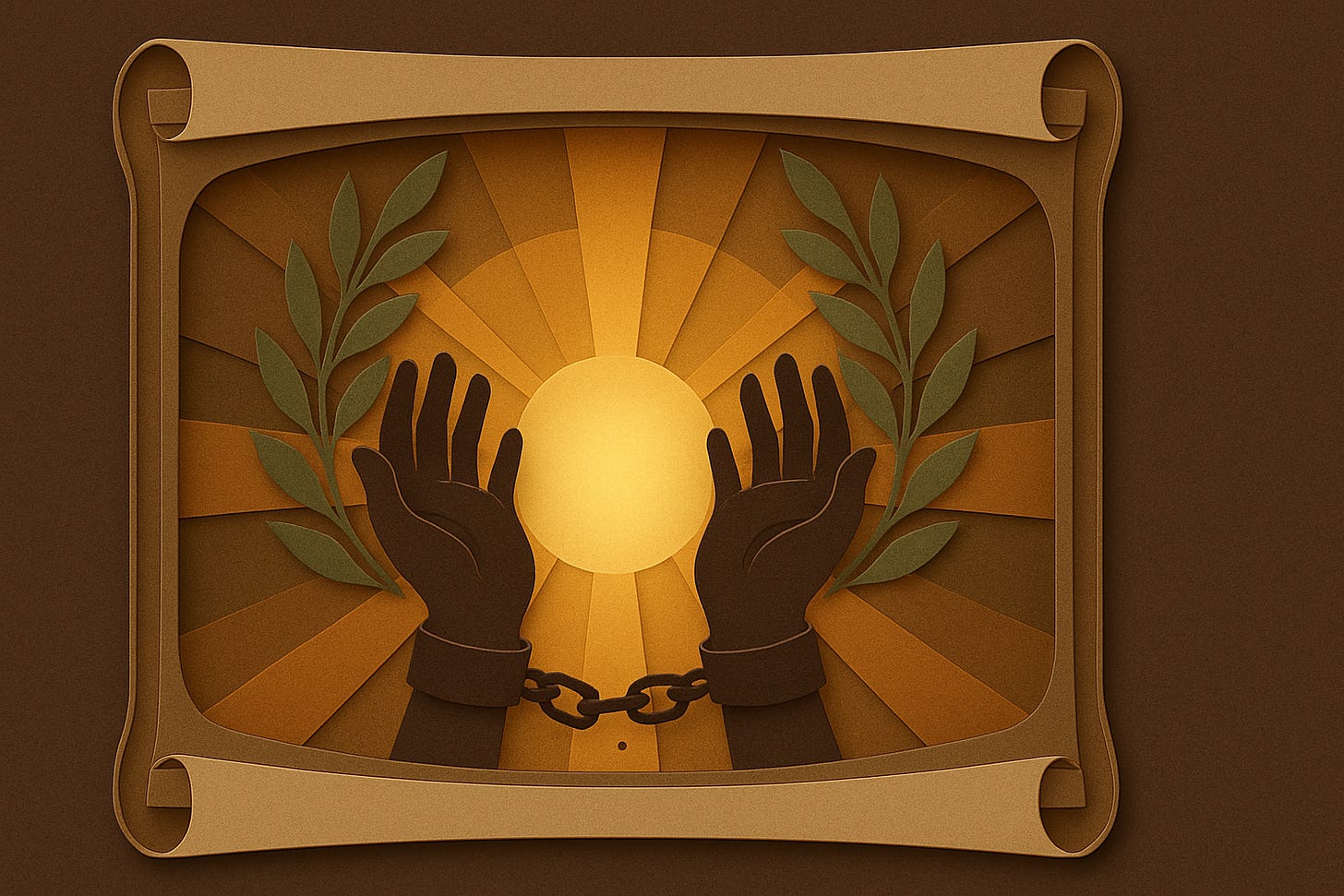CALLED – Chosen in Chains
When Yah Speaks in the Shadows and the Enslaved Answer with a Groan Too Deep for Words
CALLED — Chosen in Chains
When Yah Speaks in the Shadows and the Enslaved Answer with a Groan Too Deep for Words
It didn’t begin with captivity—it began with a calling.
Before the ships, before the shackles, there was a voice.
One might assume the story of the Black Ekklesia in Babylon begins with capture—
with chains and auctions, sugarcane and sorrow.
But it doesn’t.
It begins with a call.
Long before ships crossed the Atlantic,
before the Bible was twisted to justify slavery, before “Christianity” became a colonial export—
Yah had already set apart a people for Himself:
“Before I formed you in the womb, I knew you. Before you were born, I set you apart…” — Jeremiah 1:5
Among those taken from West and Central Africa were many ethnic groups and spiritual traditions.
But scattered among them were some whose ancestors had already been scattered—
remnants of the House of Israel, exiled by Assyria, scattered by Rome, sown like seed across the earth just as the prophets foretold:
“I will scatter you among the nations... yet I will not destroy you completely.” — Jeremiah 30:11
This story is not claimed exclusively by one group.
But neither should the pattern be ignored:
Yah keeps track of His scattered ones.
The transatlantic slave trade did not interrupt prophecy — it revealed it.
The enslaved were not simply captured.
They were called.
What the Devil Meant for Evil…
What the oppressors meant for control, Yah used for revelation.
What the slavers intended for subjugation, He transformed into a sanctuary:
“As for you, what you meant for evil against me, God meant for good…” — Genesis 50:20
The enslavers handed down a gospel laced with lies.
They stripped out Exodus.
They censored liberty.
They preached obedience to masters.
They built churches that baptized injustice and called it divine order.
But still—Yah spoke.
He bypassed plantation theology and whispered in the night.
He moved in hush arbors, in forbidden gatherings under moonlight, in trembling hands that found Him without ever reading Greek or Hebrew.
The enslaved believed the truth buried inside the lies.
They heard Go Down Moses even when Pharaoh held the pulpit.
They believed in a Savior who sets captives free—even when the Slave Bible said otherwise.
And what emerged was one of the truest expressions of covenant community this land has ever seen.
They shared all things in common—because they had nothing to lose but each other.
They prayed and fasted and wept together—not to impress, but to survive.
They made altars out of dirt and worshiped without walls.
They sang Scripture before they could read it—and lived it better than those who could.
They were not just victims.
They were ekklesia—called-out ones in the deepest sense.
Not an institution built by man, but a people led by the Spirit.
Not organized religion—but the living remnant Yah always preserves.
The plantation gave them a pulpit of control,
but the wilderness gave them a voice of covenant.
They did not know the term koinōnia.
But they lived it.
They were not trying to start a denomination.
They were crying out to the Elohim of Abraham, Isaac, and Jacob—
and He answered them.
This is where the story begins.
Not in cathedrals.
Not in seminaries.
But in the margins of empire, where Yah always begins His work.
The story of the Black ekklesia did not begin in a sanctuary with stained glass.
It began beneath trees.
In fields.
In groans.
What emerged was not a church brand—
but a covenant people.
Even in Babylon, He sets apart a remnant.
Even in slavery, He calls sons and daughters:
“He has shown strength with His arm; He has scattered the proud… and lifted up the humble.” — Luke 1:51–52
Meanwhile, in the Scrolls…
Centuries earlier, another exile unfolded.
Jerusalem had fallen.
The Temple burned.
The people of Yah had been taken into Babylon — not for annihilation, but for purification.
Among the captives were young men of royal blood: Daniel, Hananiah, Mishael, Azariah.
Chosen by Babylon. But already called by Yah:
“Among these were some from the tribe of Judah... youths without blemish, skillful in all wisdom... to be taught the literature and language of the Chaldeans.” — Daniel 1:3–4
They didn’t arrive with scrolls in their hands.
They arrived with covenant in their bones.
Like the enslaved who survived the Middle Passage, they were marked not just by suffering — but by selection.
Not by empire, but by Elohim.
They were renamed.
Reeducated.
Reassigned.
But they were never forgotten.
The Call Echoes Across Time
In the fields of Babylon, Daniel remembered Yah.
In the cotton fields of America, the groans of the enslaved rose like incense:
“Likewise the Spirit helps us in our weakness… with groanings too deep for words.” — Romans 8:26
This is not just Israel’s story.
It is a prophetic mirror.
The same Yah who called Israel in exile is calling the Black ekklesia now.
The same covenant that preserved Daniel still speaks today.
And that call cannot be fully understood apart from the One who fulfilled it all.
Because exile was never the end:
“Out of Egypt I called My Son.” — Matthew 2:15
“I was sent only to the lost sheep of the house of Israel.” — Matthew 15:24
The same Yeshua who stood with the oppressed, who wept over Jerusalem, who warned of false shepherds, and told His disciples “they will hand you over to synagogues and kings” — is still calling today.
But a calling doesn’t stop captivity.
And a chosen people can still be chained—
not because they were forgotten,
but because they began to forget.
Next: CAPTURED — Broken in Babylon


